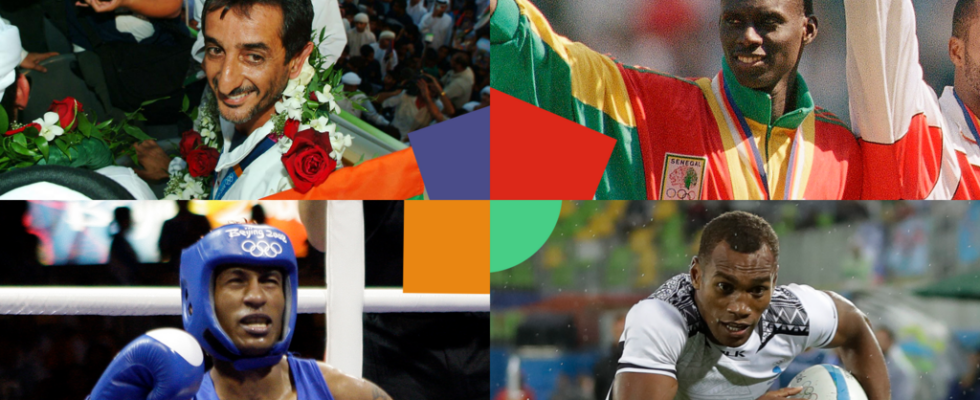As the Paris 2024 Olympic Games approach, RFI looks back at these medalists who shed light on their countries that are not used to monopolizing the podiums. Today, focus on the Senegalese Amadou Dia Ba, the Mauritian Bruno Julie, the Fiji rugby sevens team and the Emirati Ahmed al-Maktoum.
5 mins
Amadou Dia Ba, the Senegalese who challenged the invincible Americans in 1988
Forever the first! And still today still the only one. Before the Paris Olympics, Senegal only has one medal in its Olympic record. It is the work of Amadou Dia, silver medalist at the Seoul Olympics in 1988 over 400 meters hurdles. This medal was a quest for the native of Dakar who began his career with the high jump. Present at the Los Angeles Olympics four years earlier, Dia Ba finished in a frustrating fifth place, one second off the podium. “ I was new and made mistakes I could have avoidedhe declared later. So with my coach, we set to work to win the medal. » This September 25, 1988, on the track of the Olympic stadium in Seoul, the Senegalese made the race of his life and finished, for four hundredths of a second, behind the American André Phillips and in front of Edwin Moses, reigning Olympic champion and undefeated since 1976. Back in Senegal, the author of the greatest sporting feat in the country’s history at the time, is welcomed as a hero by the President of the Republic, Abdou Diouf. The state grants him numerous rewards, including a house and a car. Today, Amadou Dia Ba directs the African Athletics Development Center (CDAA) in Dakar.
The golden seven of Fijian rugby players at Rio 2016
We do not know if the Fiji Islands had to do intense lobbying at the level of the International Olympic Committee (IOC) for rugby sevens to be integrated into the Olympic Games, but there is no doubt that when this was made official for the Rio Games, it was a celebration for the 900,000 inhabitants of this archipelago. And for good reason, the IOC had just included Fiji’s national sport in the Olympics. This country, still without an Olympic medal, would finally write its name in the history of the Olympic Games by winning the gold medal in Rio. Already double world champions in rugby sevens, the Fijians flew through the Olympic tournament with prestigious successes against teams like those of Great Britain, Australia and New Zealand, beaten in the final. This first medal honored talented athletes now considered living gods in the country. Players who have “ a set of illusionist hands on a bulldozer chassis », wrote their coach Ben Ryan. The Fijian rugby players retained their title four years later in Japan and the women also won bronze at the Tokyo Olympics. Three Olympic medals in the history of the Fiji Islands, all thanks to rugby sevens. A national sport, they tell you…
Bruno Julie, the eternal pride of Mauritius at the Beijing Olympics
This August 18, 2008, on the ring of the Beijing Workers’ sports center, Bruno Julie steps forward to honor his appointment with history. The bantamweight boxer, nicknamed “The Mauritian Magician” or “the Creole crusher”, is in the quarter-finals and one step away from an Olympic medal. The whole of Mauritius is following the fight live against the Venezuelan Hector Manzilla. The feat is there, Julie qualifies for the semi-final and remains assured of getting on the podium. It will offer Mauritius its first, and for the moment, only Olympic medal. She will be in bronze after her narrow defeat to the Cuban Yankiel Leon. But the main thing is elsewhere, and Bruno Julie can proudly brandish his medal in front of his mother, Hélène, who did not agree when he started boxing at 13 in the Plaisance district of Rose-Hill. “ I won this medal for all Mauritians », he will say on his return to Port-Louis. At the end of his career, Bruno Julie became a boxing coach with the ambition of finding his successor.
Ahmed al-Maktoum, the Emirati with the golden gun in Athens 2004
The first (and only) Emirati Olympic champion since his double trap shooting victory at the 2004 Olympic Games, Ahmed al-Maktoum remains a great hero in the United Arab Emirates. A member of the Al-Maktoum family, which has ruled the emirate of Dubai since the beginning of the 19th century, Ahmed was born almost with a gun in his cradle. His grandfather and father were shooters and he received his first weapon at the age of four. However, we had to wait until he was 34, after playing basketball and squash, to see the future medalist get involved in shooting. Helped by his rich family, who built him a replica of the Sydney Olympic shooting gallery, Ahmed al-Maktoum made rapid progress until he was recognized in Greece. He will have difficulty confirming in Beijing in 2008 with an absence in the final. For the London Games, a medical contraindication prevents him from competing, less than a year before the Olympics. Unable to participate in the 2012 Olympic Games, he became the coach of Briton Peter Wilson. The latter will win the gold medal in double trap.
